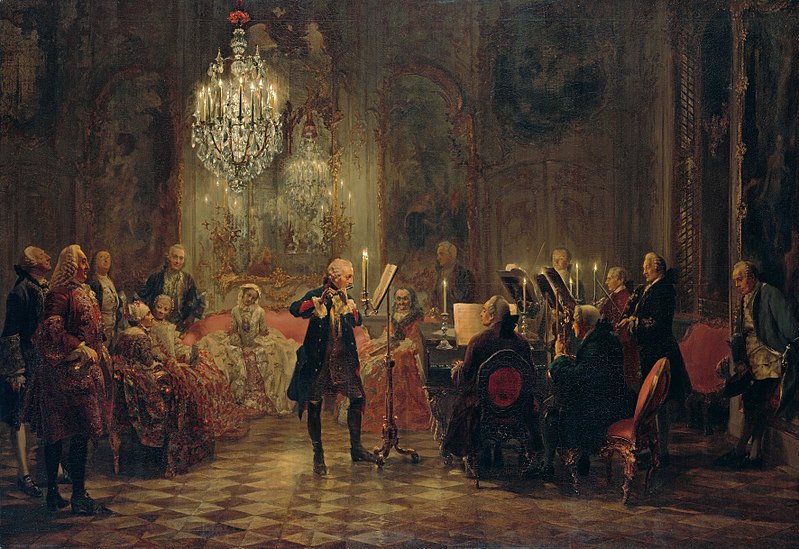A Musical Offering
Length/format: 75 minutes
Genre: Dance/Theatre improvisation
Director/Choreographer/Producer: Louis Ziegler
Writer: Gareth Jones
Musician: Fiona Howe
In brief: A Musical Offering or une offrande musicale was an investigative reflection in music, drama and dance, on the contested circumstances surrounding the creation of J S Bach’s work of the same name, one of the most mysteriously chromatic pieces he composed.
Rehearsed and performed in only one day, this entertainment was delivered according to the strictly improvisational rules of Strasbourg choreographer Louis Ziegler’s series of events performed on the 9th of each month and entitled le neuf.
The team had had only one previous discussion on the subject. There was no script, no cast, no production in place but the finished piece had to be performed that night. Decisions were taken in the space of seconds: Ziegler danced the spirit of JS Bach; Jones acted Frederick of Prussia; Howe delivered Bach’s music, including the famous theme, on her flute. The brass baptismal font of the church venue provided additional percussion and fugal entries played on the Silbermann organ were echoed by physical, danced entries through the doors of the church.
The piece raised the question – was the famous musical encounter that led to das musikalische Opfer itself an improvisation or something else?
On the summons of King Frederick of Prussia, Johann Sebastian arrives jolted and dusty in Potsdam and is summoned immediately into the royal presence without time to catch his breath or change his clothes, no doubt to the amusement of the court. Society had grown weary of the staid counterpoint developed by ‘der alte Bach‘, whose son Carl Philipp Emanuel was now in fashion as Kapellmeister in Berlin and championing a more melodic, sentimental style.
Frederick was himself a competent flautist, as recorded in Adolph von Menzel’s canvas Flötenkonzert Friedrichs des Großen in Sanssouci (“Frederick the Great’s Flute Concert in Sanssouci”). He prided himself on his composition. Old Bach’s visit was to be a musical triumph.
Arriving in the king’s presence, Bach is asked to dream up for Frederick the most difficult theme he can offer. Stung by the humiliation already meted out, he comes up with the fiendishly difficult musikalisches Opfer, which Frederick duly played, before challenging Bach to improvise his outmoded counterpoint to precisely the same theme. Apparently Bach achieved this, to the frank amazement of the court. Bach’s own title word Opfer of course has a secondary meaning, besides Offering, and that is Sacrifice. For the old man, it must have been just that.
But is any of this true?
The question posed by our improvisation was:
Was this genuine improvisation? Would Frederick (or Bach for that matter) ever have exposed themselves to potential ridicule? This was not the occasion for rehearsal!
Or had the entire evening been the subject of diplomatic musical exchanges relayed by Carl Philipp Emanuel to ensure that neither his royal master nor his father composer were embarrassed on the night?
Who was the real author of that famous theme?
The performance also explored the function of music in war and vice-versa, Frederick being known not only as a sexual predator with a sadistic streak but also as the most capable general of that or any other era, a skill that gave him the honorific ‘the Great’, not, alas, his flute playing.
The subject remains the source of musicological speculation but this show surely helped rekindle the debate.




